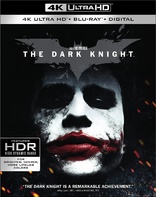The Dark Knight 4K Blu-ray Movie
HomeThe Dark Knight 4K Blu-ray Movie 
4K Ultra HD + Blu-ray + Digital CopyWarner Bros. | 2008 | 152 min | Rated PG-13 | Dec 19, 2017
Movie rating
9.1 | / 10 |
Blu-ray rating
| Users | 4.9 | |
| Reviewer | 4.5 | |
| Overall | 4.5 |
Overview
The Dark Knight 4K (2008)
With the help of Lieutenant Jim Gordon and District Attorney Harvey Dent, the Batman has been making headway against local crime... until a rising criminal mastermind known as The Joker unleashes a fresh reign of chaos across Gotham City. To stop this devious new menace — Batman's most personal and vicious enemy yet — he will have to use every high-tech weapon in his arsenal and confront everything he believes.
Starring: Christian Bale, Heath Ledger, Aaron Eckhart, Michael Caine, Maggie GyllenhaalDirector: Christopher Nolan
| Action | Uncertain |
| Adventure | Uncertain |
| Sci-Fi | Uncertain |
| Epic | Uncertain |
| Comic book | Uncertain |
| Thriller | Uncertain |
| Crime | Uncertain |
Specifications
Video
Video codec: HEVC / H.265
Video resolution: 4K (2160p)
Aspect ratio: 2.40:1, 1.78:1
Original aspect ratio: 2.39:1
Audio
English: DTS-HD Master Audio 5.1 (48kHz, 24-bit)
French (Canada): Dolby Digital 5.1
Spanish: Dolby Digital 5.1
Portuguese: Dolby Digital 5.1
Thai: Dolby Digital 5.1
Subtitles
English SDH, French, Portuguese, Spanish, Mandarin (Simplified), Thai
Discs
Blu-ray Disc
Three-disc set (3 BDs)
Digital copy
BD-Live
4K Ultra HD
Packaging
Slipcover in original pressing
Playback
Region free
Review
Rating summary
| Movie | 4.5 | |
| Video | 4.0 | |
| Audio | 5.0 | |
| Extras | 4.0 | |
| Overall | 4.5 |
The Dark Knight 4K Blu-ray Movie Review
Why So Delerious?
Reviewed by Michael Reuben February 21, 2018Whatever one's personal ranking of the three films in Christopher Nolan's Dark Knight Trilogy,
the indisputable jewel in the crown is 2008's The Dark Knight (or "TDK"). Anticipation for the
film's 2008 theatrical release had already reached fever pitch when TDK received a morbid PR
boost from the untimely death of co-star Heath Ledger after an accidental drug overdose.
Ledger's career-defining performance as the Joker, for which he would receive a posthumous
Academy Award, towers over TDK, and Ledger's embodiment of the character, as reimagined by
Nolan and his co-writers, has cast a long shadow over every subsequent attempt to revive the
role. (Just ask Jared Leto in Suicide
Squad.) TDK may be Batman's story, but it's the Joker's
film.
TDK's original Blu-ray release in December 2008 quickly became a must-have disc for home
theater enthusiasts, and Greg Maltz's review
was a love letter to both the film and its 1080p
presentation. Since that time, however, dissenting voices have questioned the quality of that Blu-ray, which, like all of Nolan's films to date, was
derived from a film-to-video transfer instead of
a digital intermediate (a process that Nolan has so far eschewed). Even Greg's review noted a
"digital sheen" in the Blu-ray presentation, and other viewers have decried various forms of
digital tampering, although, as Greg noted, some of the perceived issues may be inherent in the
original photography.
Perhaps the most serious complaint has been that of palette revisionism, as forcefully articulated
by film restorationist Torsten Kaiser in an interview given to my colleague Ken Brown and
quoted by Ken in his subsequent review of The
Dark Knight Rises. According to Kaiser: "By far
the biggest error its producers committed was the complete change of the film's original color
timing. . . .The original material - I held it in my hands - it was gorgeous. . . . The colors are so
different compared to those that appear in the Blu-ray transfer." (The complete interview,
published by Blu-ray.com in 2011, can be found here.)
I don't know whether the UHD presentation of TDK will satisfy every critic of the Blu-ray,
because the palette does not substantially vary from that of the 1080p version, and much of what
was deemed digital tinkering remains (although whether that's what it truly is remains subject to
debate, as should be evident from the sources quoted above). If anything, TDK's 4K rendition
even adds an occasional artifact not seen in 1080p, a point further discussed in "Video".
However, all such criticisms have to be considered in the context of the UHD's undeniable
virtues. The film's striking imagery has become somewhat familiar in the decade since its
release, a byproduct of multiple viewings and repeated quotation, including frequent internet
postings. (I can't count how many times I've seen the clip of Ledger's Joker laughing in
Batman's face or enthusiastically clapping in his jail cell.) The film's 4K/HDR presentation
blows the cobwebs off every shot, restoring the heady and hallucinatory allure of the Joker's
Gotham and the chaos he unleashes upon it. As is so often the case with a superior new version,
watching TDK on UHD takes us back to the excitement of our first encounter with the film and
reminds us of why we were so moved and astonished by it in the first place.
Like every other film in the Christopher
Nolan
Collection, TDK has been newly transferred at 4K
resolution from its original negative, then color corrected and HDR graded under the director's
supervision. As noted in previous reviews, the simultaneous release in 4K of every feature film
that Nolan has made in the prevous twelve years reflects his conviction that UHD is the
definitive home video technology of our era and the best way for his films to be seen outside of
theatrical venues. In support of that conviction, Nolan has personally overseen every aspect of
these releases, from the element selection down to the packaging. Rarely has the notion of "director approved" been more
apt or more literally true.
In addition to its single release, TDK is also available in the three-film Dark Knight Trilogy 4K,
as well as the aforementioned Christopher
Nolan Collection.
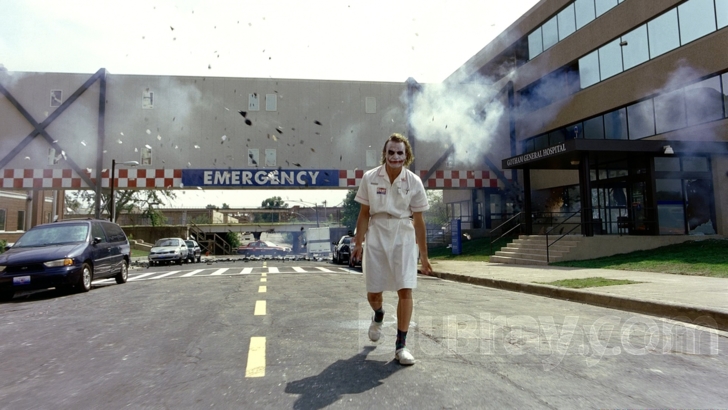
For a thoughtful discussion of TDK, please refer to Greg Maltz's 2008 Blu-ray review.
The Dark Knight 4K Blu-ray Movie, Video Quality 
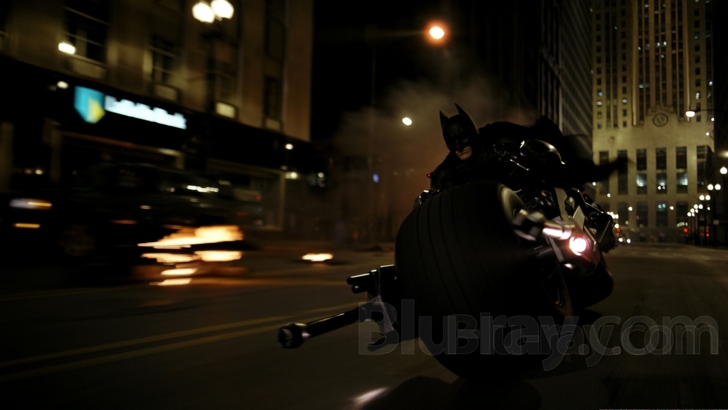
(Note: Screenshots accompanying this review are 1080p captures from the 2008 standard
Blu-ray. Additional captures can be found here.)
The Dark Knight was the first project on which Nolan and cinematographer Wally Pfister began
mixing IMAX and 35mm footage, previewing their experiment by including TDK's IMAX-filmed opening as an extra on Batman Begins. First on Blu-ray, and now again on UHD,
the
presentation features a shifting aspect ratio, with the IMAX sections formatted at 1.78:1 and
35mm portions framed at 2.40:1.
A frequent approach in UHD reviews is to highlight a handful of examples of where the 4K
image does or doesn't show improvements over the Blu-ray. Certainly that review strategy could
be easily applied to Warner's 2160p, HEVC/H.265-encoded UHD disc of TDK, which has been
sourced from a new 4K scan that has been color-corrected and HDR graded
under the director's supervision. One could point to the finer, more realistic rendition of the
cracks and streaks in the Joker's clown makeup (not to mention the skin pores visible beneath the
disguise); the fresh intensity of the colors in the clown masks worn by his gang in the opening
bank heist; the elegant refinement of the gray streaks in the hair of gang boss Sal Maroni; the
exceptional shadow definition in the nearly-all-black shot of Batman lurking outside Jim
Gordon's home when his family receives the bad news; and the growing blackness of Harvey
Dent's eyes as he interrogates one of Joker's thugs with coin tosses and Russian roulette. There
are literally hundreds of such examples throughout TDK's two and a half hours.
But after spending several days watching and rewatching TDK in both formats, I'm left with an
overall impression that transcends the details of any single image. Even more than the other two
films in the trilogy, which have also received impressive 4K makeovers, there is something about
TDK on UHD that is simply hypnotic. I start out watching a specific passage to compare it to the
Blu-ray, but then I don't turn it off. The sheer intensity the film's visuals is too mesmerizing to
interrupt; the freshness and immediacy with which the UHD brings Nolan's evocation of a world
on the brink of collapse into one's viewing room is too addictive to quit. One can object to the
heavy cyan wash cast over numerous sequences—a quality the 4K treatment shares with the Blu-ray—or quibble with the added brightness found in
scenes like Batman's abduction of Lau from
his Hong Kong office tower, and one can certainly fault the occasional video artifact that pops up
from time to time as an unwanted distraction. But the overall impact of this new TDK rendition
can't be denied. Its pull is irresistible.
About those video artifacts: As in the 4K version of Batman Begins, TDK has a few instances of
aliasing, which as noted in the earlier review, isn't something one expects to encounter at this
resolution and with today's software tools. The most obvious instance occurs in the film's
opening shot, as the camera (the IMAX camera!) pushes in above Gotham toward the building
from which Joker's gang begin their assault on the mob bank. Multiple closely space horizontal
edges of building slats and grille work vibrate with the motion of the shot. (This does not occur
on the Blu-ray.) Another, much subtler example occurs in the long shot where Lucius Fox and
Bruce Wayne enter the armory as they are discussing high-altitude jumps; the banks of suspended
ceiling lights vibrate noticeably, if you happen to glance upward from the actors. (This does
occur on the Blu-ray, and the UHD handles it somewhat better.) As with Batman Begins, I
consider this more of a video problem than a 4K problem and have adjusted the disc's scores
accordingly.
(Note: The original version of this review incorrectly stated that this UHD was derived from the camera negative. That assertion was
based on incorrect information supplied by Warner Brothers. It has now been confirmed from multiple sources that the 4K/HDR master was derived
from an interpositive, at Christopher Nolan's express instruction and contrary to Warner's standard policy, which provides that 4K scans should utilize
the existing element with the greatest resolution. We regret the error; the scores for Video and 4K have been adjusted.)
(Additional Note: The disc I reviewed was a BD-100. It has been reported that later pressings used a BD-66. Since I do not have that disc, I
cannot evaluate what difference, if any, such a change would make to the image.)
The Dark Knight 4K Blu-ray Movie, Audio Quality 
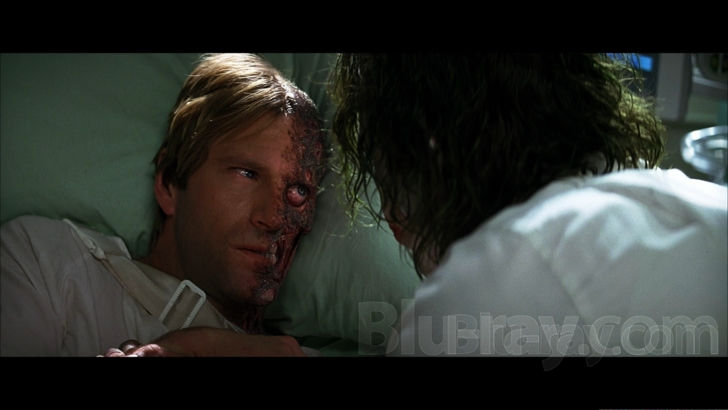
The 2008 Blu-ray's Dolby TrueHD 5.1 track (discussed here) received a 5.0 rating, which leaves me no room to increase it for the UHD's re-encoding of the same track in DTS-HD MA. Still, to my ear, the new version is even more powerful than its room-rattling predecessor, with even deeper bass and a broader dynamic range that expands the contrast between thunderous action beats and quieter passages of dialogue. (This has the effect of rendering the quiet moments more ominous, because you know something big and loud is just around the corner.) Rear channel use remains sparing but effective, and the track's overall volume appears to be louder. Whatever setting you may have used for the Blu-ray's TrueHD mix is likely to be too loud for the UHD's lossless DTS.
The Dark Knight 4K Blu-ray Movie, Special Features and Extras 
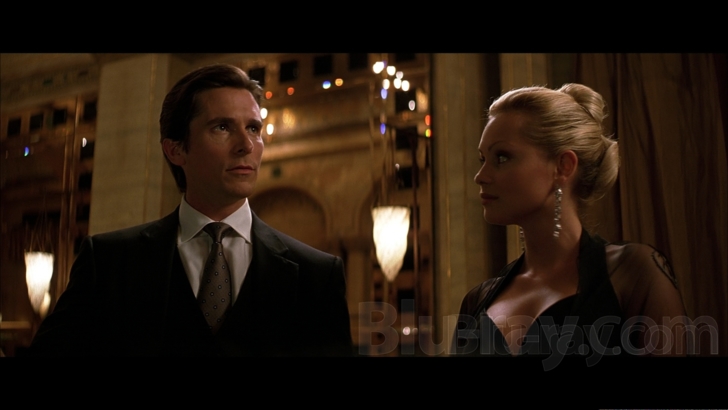
The UHD disc contains no extras. The three-disc package includes reprints of the feature and extras disc released in 2008, of which the supplemental content is listed here.
The Dark Knight 4K Blu-ray Movie, Overall Score and Recommendation 
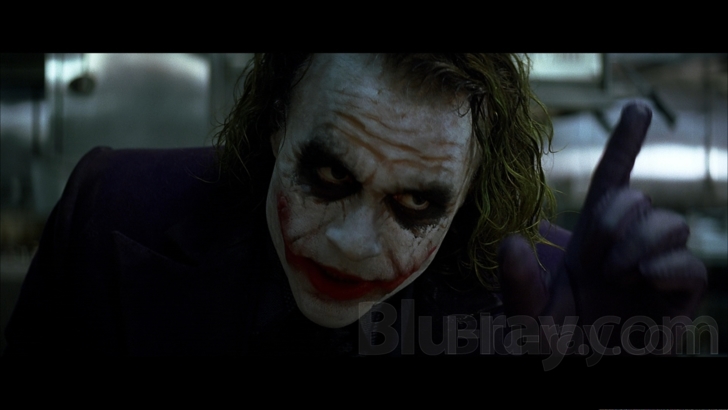
TDK isn't my favorite of the three chapters in Nolan's Batman trilogy, and I continue to think it
suffers from major flaws, particularly in the third act, which is overlong, choppy in its pacing and
risks losing its focus on Harvey Dent's fall from grace with the unnecessary distraction of the
ferryboat bomb plot. Still, TDK remains a signature moment in both Nolan's work and in the
history of Batman sagas. Once you've experienced the film, it's impossible not to feel its
reverberations throughout the entire trilogy. It's that powerful a creation, and the UHD gives it
the most forceful expression to date. Highly recommended.
Other editions
The Dark Knight: Other Editions

The Dark Knight
2008

The Dark Knight
2008

The Dark Knight
Bat-Pod Display Case | Limited Edition
2008

The Dark Knight
Batman Mask Packaging
2008

The Dark Knight
Exclusive Joker Mask Edition | Batman
2008

The Dark Knight
Platinum Collection / Batman
2008

The Dark Knight
Batman
2008

The Dark Knight
includes Sneak Peek at Batman Dark Knight Reborn
2008

The Dark Knight
Batman
2008

The Dark Knight
Batman
2008

The Dark Knight
2008

The Dark Knight
2008

The Dark Knight
with Justice League Movie Money
2008
Similar titles
Similar titles you might also like

The Dark Knight Rises
2012

Batman Begins 4K
2005

Tenet 4K
2020

Inception 4K
2010

Spider-Man 3
2007

Iron Man 3
2013

Captain America: The Winter Soldier 4K
Cinematic Universe Edition
2014

X-Men: The Last Stand
2006

X-Men
Icons
2000

X2: X-Men United
2003

Spider-Man 2
2004

Terminator 2: Judgment Day 4K
+BD with the 3 versions
1991

Mission: Impossible - Fallout 4K
IMAX Aspect Ratio
2018

Iron Man 4K
2008

Terminator Genisys 4K
2015

Skyfall 4K
2012

Mad Max: Fury Road 4K
2015

Terminator Salvation
Director's Cut
2009

Vice
2015

Spectre
2015
